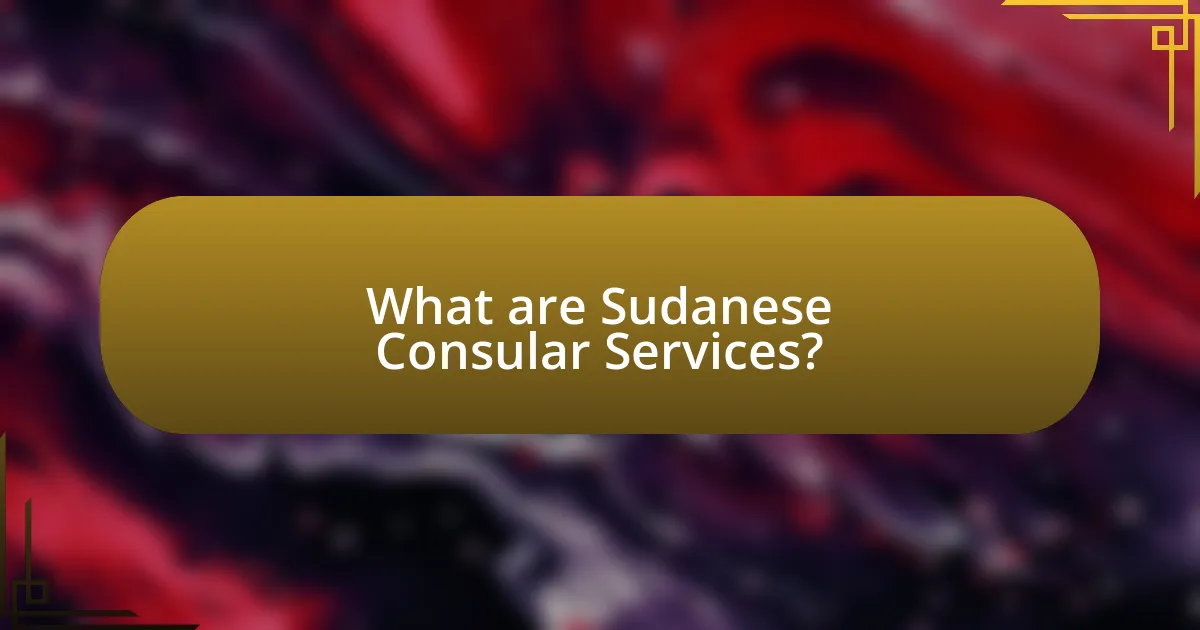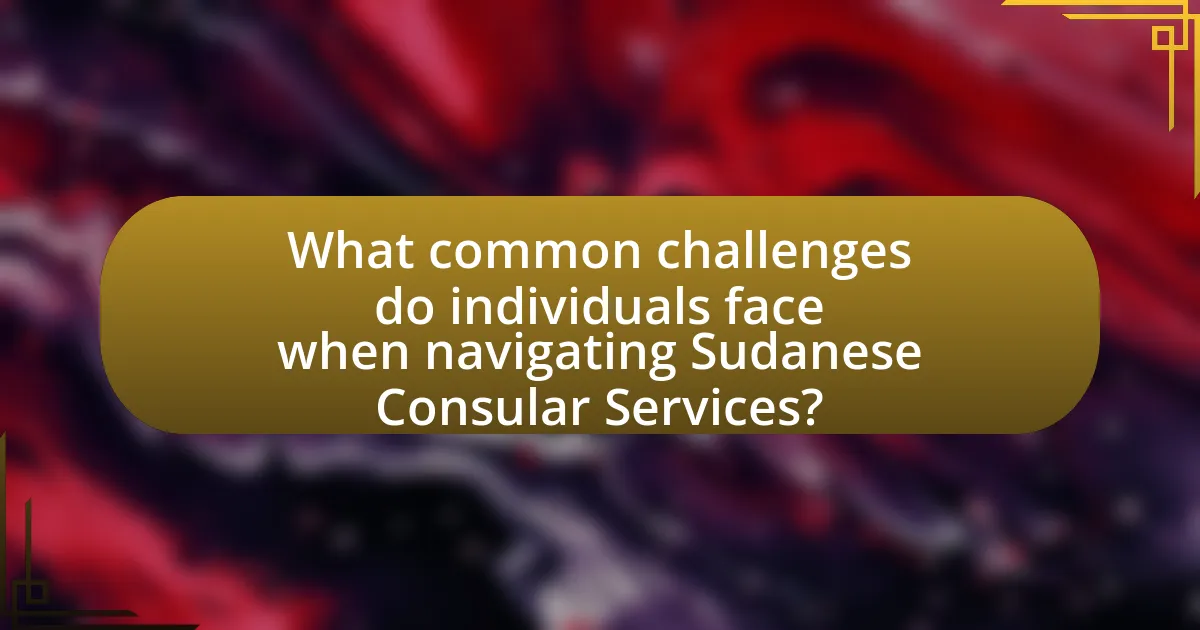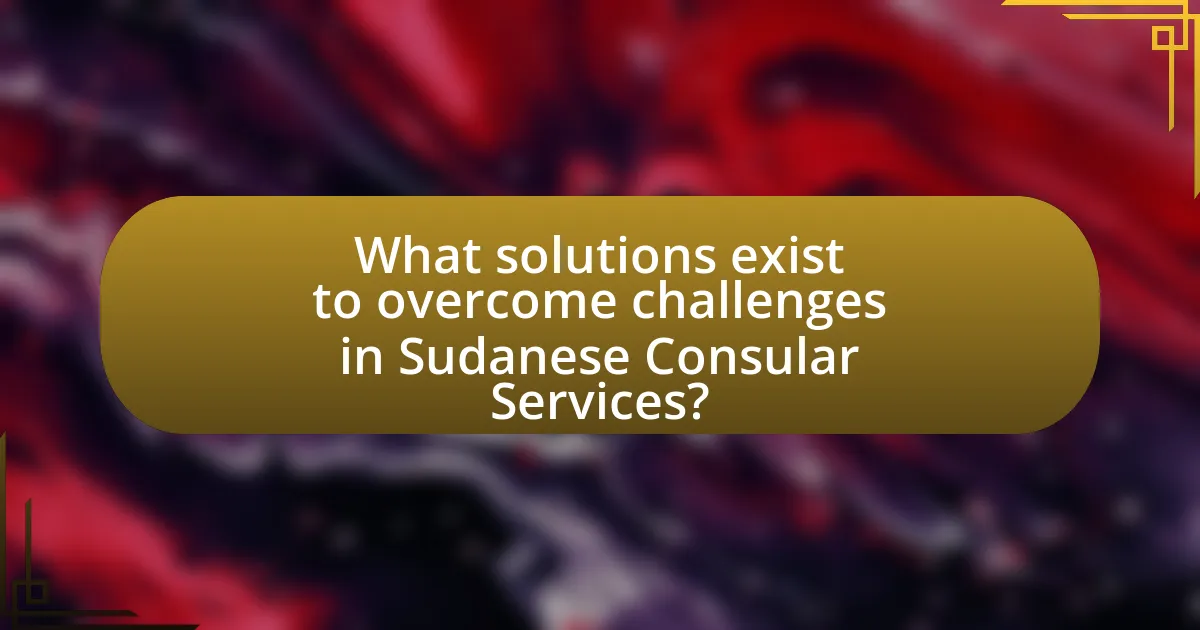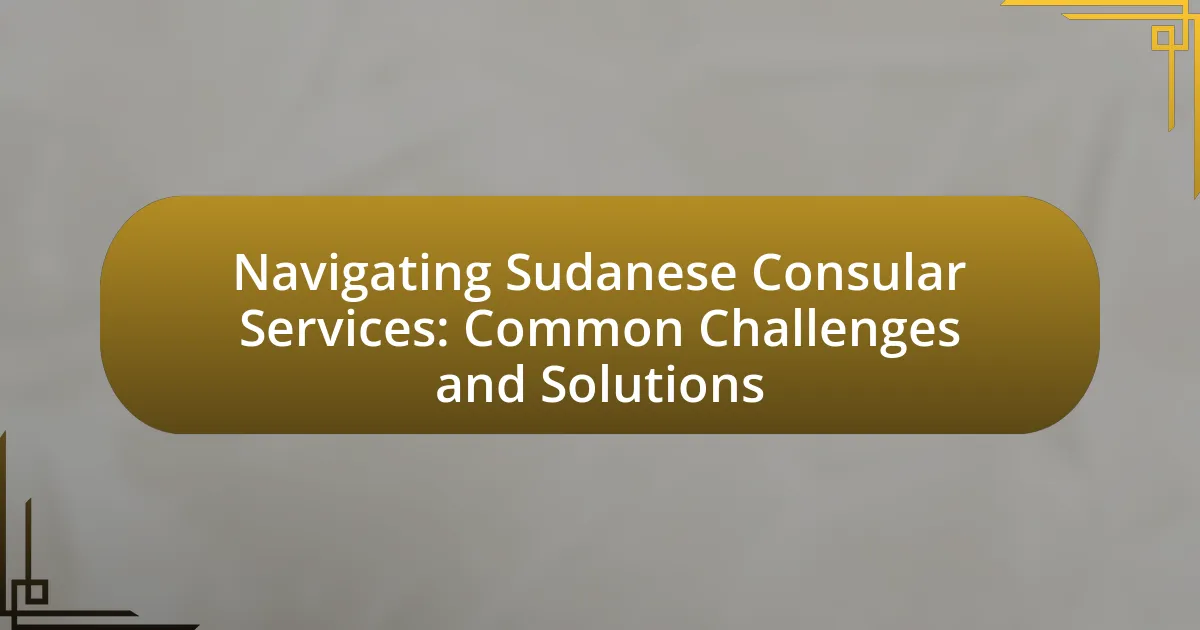Sudanese Consular Services are official services provided by Sudanese embassies and consulates to assist both Sudanese citizens and foreign nationals. These services encompass the issuance of passports, visas, and legal documents, as well as emergency support and notarial services. The article explores the functioning of these services, the types offered, and the variations based on location, highlighting their importance in protecting citizens abroad. It also addresses common challenges faced by individuals, such as bureaucratic inefficiencies and language barriers, while proposing solutions to enhance service delivery and improve user experience. Key takeaways include the significance of understanding documentation requirements and the role of technology in streamlining consular processes.

What are Sudanese Consular Services?
Sudanese Consular Services are official services provided by Sudanese embassies and consulates to assist Sudanese citizens and foreign nationals. These services include issuing passports, visas, and other travel documents, as well as providing legal assistance, notarial services, and support in emergencies. The Sudanese government established these services to facilitate international travel and protect the rights and interests of its citizens abroad.
How do Sudanese Consular Services function?
Sudanese Consular Services function by providing assistance to Sudanese citizens abroad and facilitating diplomatic relations. These services include issuing passports, visas, and legal documents, as well as offering support in emergencies, such as legal issues or natural disasters. The Sudanese government operates consulates and embassies in various countries to ensure that citizens have access to necessary services and information. For instance, the Sudanese embassy in Washington, D.C., serves as a critical point for Sudanese nationals in the United States, helping them navigate legal and administrative processes.
What types of services are provided by Sudanese consulates?
Sudanese consulates provide a range of services including passport issuance, visa processing, and assistance with legal matters. These services are essential for Sudanese citizens living abroad, as they facilitate travel and legal documentation. For instance, consulates help in renewing passports, issuing emergency travel documents, and providing notarial services. Additionally, they offer support in cases of emergencies, such as providing assistance to citizens in distress or facilitating communication with local authorities.
How do these services vary by location?
Sudanese consular services vary significantly by location due to factors such as local demand, resource availability, and regional regulations. For instance, consulates in urban areas like Khartoum typically offer a wider range of services, including passport issuance and legal assistance, compared to those in rural regions, which may have limited capabilities and reduced operating hours. Additionally, the presence of a larger Sudanese diaspora in cities influences the frequency and type of services provided, as consulates in these areas often adapt to meet the needs of their communities.
Why are Sudanese Consular Services important for citizens?
Sudanese Consular Services are crucial for citizens as they provide essential support in legal, administrative, and emergency situations abroad. These services facilitate passport issuance, assist with legal documentation, and offer guidance during crises, ensuring that Sudanese citizens can navigate foreign legal systems and maintain their rights. For instance, in 2021, the Sudanese consulate in Egypt helped over 1,000 citizens with passport renewals and legal assistance, demonstrating their vital role in protecting the interests of Sudanese nationals overseas.
What role do these services play in protecting citizens abroad?
Sudanese consular services play a crucial role in protecting citizens abroad by providing assistance during emergencies, legal issues, and ensuring access to essential resources. These services facilitate communication between citizens and local authorities, offer guidance on navigating foreign legal systems, and help in cases of detention or legal disputes. For instance, Sudanese embassies and consulates can intervene on behalf of citizens facing legal challenges, ensuring their rights are upheld according to international law. Additionally, they provide vital information regarding safety, health services, and evacuation procedures during crises, thereby enhancing the overall security and well-being of Sudanese nationals overseas.
How do consular services assist with legal matters?
Consular services assist with legal matters by providing guidance and support to citizens facing legal issues abroad. They offer services such as notarization of documents, assistance in locating legal representation, and information on local laws and legal procedures. For instance, consulates can help citizens understand their rights in a foreign legal system, which is crucial for navigating complex legal situations. Additionally, they may facilitate communication between the citizen and local authorities, ensuring that the individual’s legal rights are upheld.

What common challenges do individuals face when navigating Sudanese Consular Services?
Individuals face several common challenges when navigating Sudanese Consular Services, including bureaucratic inefficiencies, language barriers, and limited access to information. Bureaucratic inefficiencies often result in long wait times and complex procedures, making it difficult for individuals to complete necessary tasks efficiently. Language barriers can hinder effective communication, especially for non-Arabic speakers, complicating the process of obtaining services. Additionally, limited access to accurate and timely information about consular services can lead to confusion and frustration, as individuals may struggle to find the necessary documentation or understand the requirements for various services.
What are the most frequently encountered issues?
The most frequently encountered issues in navigating Sudanese consular services include long wait times, lack of clear information, and bureaucratic inefficiencies. Long wait times are often reported due to high demand and limited staffing, leading to frustration among applicants. Additionally, many individuals face challenges in obtaining accurate and timely information regarding required documents and procedures, which can result in delays and confusion. Bureaucratic inefficiencies, such as excessive paperwork and unclear processes, further complicate the experience for those seeking consular assistance. These issues have been documented in various reports, highlighting the need for improvements in service delivery and communication within Sudanese consulates.
How does language barrier affect access to services?
Language barriers significantly hinder access to services by creating communication obstacles between service providers and individuals seeking assistance. When individuals cannot effectively communicate their needs or understand the information provided, they may miss out on essential services, face delays, or receive incorrect assistance. For instance, a study by the Migration Policy Institute found that limited English proficiency can lead to lower utilization of healthcare services, resulting in poorer health outcomes. This illustrates how language barriers directly impact the ability to access vital services, particularly in multicultural contexts like Sudan, where diverse languages are spoken.
What are the common delays in service processing?
Common delays in service processing include bureaucratic inefficiencies, inadequate staffing, and lack of clear communication. Bureaucratic inefficiencies often arise from complex procedures that require multiple approvals, leading to longer wait times. Inadequate staffing can result in overwhelmed personnel, causing delays in processing applications and requests. Additionally, lack of clear communication between consular staff and applicants can lead to misunderstandings and incomplete submissions, further prolonging the service processing time. These factors collectively contribute to the overall delays experienced in consular services.
Why do individuals struggle with understanding the requirements?
Individuals struggle with understanding the requirements due to a lack of clear communication and complex bureaucratic processes. The Sudanese consular services often present information in a manner that is not easily accessible, leading to confusion among applicants. For instance, the use of technical jargon and insufficient guidance can hinder comprehension. Additionally, varying interpretations of requirements by different consulates can create inconsistencies, further complicating the understanding process. Research indicates that effective communication strategies significantly improve comprehension, highlighting the need for clearer guidelines in consular services.
What documentation is typically required for consular services?
Consular services typically require documentation such as a valid passport, visa application forms, proof of residence, and identification documents. These documents are essential for verifying identity and eligibility for services like visa issuance, passport renewal, or legal assistance. For instance, a valid passport serves as the primary identification, while a visa application form provides necessary details about the traveler’s intent and duration of stay. Additionally, proof of residence, such as utility bills or lease agreements, may be required to establish the applicant’s current living situation.
How can misinformation lead to complications?
Misinformation can lead to complications by causing individuals to make incorrect decisions regarding consular services. For instance, if a person believes false information about visa requirements, they may fail to provide necessary documentation, resulting in application delays or denials. A study by the Pew Research Center found that 64% of Americans believe misinformation causes confusion about important issues, which can directly impact their interactions with consular services. This confusion can lead to increased frustration, wasted time, and potential legal issues, highlighting the critical need for accurate information in navigating consular processes.

What solutions exist to overcome challenges in Sudanese Consular Services?
To overcome challenges in Sudanese Consular Services, implementing digital platforms for service delivery is essential. These platforms can streamline processes such as visa applications and document verification, reducing wait times and improving accessibility. For instance, the introduction of online appointment systems has been shown to enhance efficiency in various consular services globally, allowing applicants to schedule visits without long queues. Additionally, training consular staff in customer service and cultural sensitivity can improve interactions with citizens, fostering trust and satisfaction. Evidence from other countries indicates that such training programs lead to better service outcomes and increased public confidence in consular operations.
How can individuals better prepare for consular visits?
Individuals can better prepare for consular visits by gathering all necessary documents and understanding the specific requirements of the consulate. This includes having a valid passport, completed application forms, and any additional paperwork such as proof of residency or financial statements. Researching the consulate’s website for specific guidelines and appointment procedures is crucial, as many consulates require appointments for services. Furthermore, individuals should familiarize themselves with the consulate’s operating hours and any potential wait times, which can vary significantly. Being well-prepared not only streamlines the process but also increases the likelihood of a successful visit.
What resources are available for understanding consular processes?
Resources available for understanding consular processes include official government websites, consulate offices, and legal aid organizations. Official government websites, such as the Sudanese Ministry of Foreign Affairs, provide detailed information on consular services, including visa applications and document authentication. Consulate offices offer direct assistance and guidance for individuals navigating specific consular issues. Legal aid organizations often provide resources and support for understanding rights and procedures related to consular services, ensuring individuals have access to accurate information and assistance.
How can technology improve access to consular services?
Technology can improve access to consular services by enabling online applications, virtual consultations, and automated information systems. These advancements allow individuals to submit requests and receive assistance without the need for physical visits, significantly reducing wait times and increasing efficiency. For instance, many consulates now offer e-services that facilitate passport renewals and visa applications, which can be completed from anywhere with internet access. Additionally, chatbots and AI-driven platforms provide immediate responses to common inquiries, enhancing user experience and accessibility. According to a 2021 report by the International Organization for Migration, digital solutions in consular services have led to a 30% increase in user satisfaction due to reduced processing times and improved service delivery.
What best practices can enhance the experience with consular services?
To enhance the experience with consular services, implementing clear communication, efficient appointment scheduling, and comprehensive online resources is essential. Clear communication ensures that applicants understand the requirements and processes, reducing confusion and errors. Efficient appointment scheduling minimizes wait times and improves service delivery, as evidenced by consulates that have adopted online booking systems, leading to a 30% reduction in in-person visits. Comprehensive online resources, including FAQs and instructional videos, empower users to navigate services independently, which has been shown to increase user satisfaction by 40%.
How can individuals effectively communicate their needs to consular staff?
Individuals can effectively communicate their needs to consular staff by being clear, concise, and prepared with relevant documentation. Clear communication involves stating the specific request or issue directly, using simple language to avoid misunderstandings. Preparation includes gathering necessary documents, such as identification, application forms, and any supporting materials, which can facilitate the process and demonstrate seriousness. Additionally, individuals should be respectful and patient, as consular staff often handle multiple cases and may require time to address each situation thoroughly. This approach aligns with best practices in customer service, where clarity and preparedness enhance the interaction’s efficiency and effectiveness.
What tips can help in gathering the necessary documentation?
To effectively gather the necessary documentation, individuals should create a comprehensive checklist of required documents specific to their consular needs. This checklist should include items such as identification, proof of residence, and any relevant legal documents. Additionally, individuals should verify the requirements on the official Sudanese consulate website or contact the consulate directly to ensure they have the most current information. Organizing documents in a systematic manner, such as categorizing them by type and ensuring they are up-to-date, can streamline the process. Furthermore, keeping copies of all submitted documents is crucial for future reference and to address any potential issues that may arise.
What are the key takeaways for navigating Sudanese Consular Services?
Key takeaways for navigating Sudanese Consular Services include understanding the specific requirements for documentation, being aware of the operating hours and appointment systems, and recognizing the importance of local language proficiency. Documentation requirements often vary based on the service needed, such as visas or citizenship applications, necessitating thorough preparation. Operating hours can be limited, and many consulates require appointments, which should be scheduled in advance to avoid delays. Additionally, proficiency in Arabic can facilitate communication and help in understanding the processes better, as many consular staff may primarily speak Arabic.

Leave a Reply